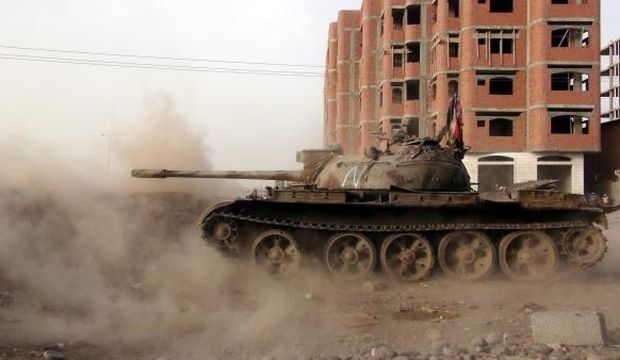
Southern militiamen loyal to Yemen’s President Abd Rabbuh Mansur Hadi fire from a tank against positions held by Houthi fighters in the southern port city of Aden, Yemen, on June 24, 2015. (EPA/Stringer)
Riyadh, Washington DC and Aden, Asharq Al-Awsat—The Yemeni armed forces are now in control of a border crossing between Yemen and Saudi Arabia that was captured on Tuesday from the Houthi movement by volunteer forces loyal to the country’s President Abd Rabbuh Mansur Hadi, a senior Yemeni military official has said.
Speaking to Asharq Al-Awsat, Brig. Gen. Mohamed Al-Makdishi, head of the General Staff of the Yemeni Armed Forces, said the military would now be sending reinforcements to the Al-Wadee’ah crossing located in the Hadhramaut province—as the Yemeni volunteer forces, known as the Popular Resistance, and military personnel currently guarding the crossing are struggling to deal with movement between Saudi Arabia and Yemen.
Al-Wadee’ah is one of four crossings linking Saudi Arabia to Yemen. The Houthis are currently in control of the remaining three.
On Tuesday, the Popular Resistance seized Al-Wadee’ah from Houthi fighters after days of fierce fighting. Eyewitnesses told Reuters thousands of Yemenis had gathered at the crossing after the volunteers captured it from the Houthis in order to flee the country into neighboring Saudi Arabia.
The crisis in the country which began when the Houthis seized the capital Sana’a last year, launched a coup against President Hadi, and began targeting civilians across Yemen has created a shortage of food, fuel and medical supplies. More than 20 million Yemenis, or 80 percent of the population, are currently at risk and in dire need of aid, according to UN estimates.
Saudi Arabia’s King Salman Bin Abdulaziz has pledged around half a billion dollars in aid to help Yemenis caught up in the conflict currently raging in the country. While the Popular Resistance fights the Houthis on the ground, Saudi Arabia and its Arab allies are waging an aerial campaign against the Houthi movement in the country.
In March, President Hadi fled to Saudi Arabia after escaping a Houthi-imposed house arrest following the Iran-backed group’s coup in February. He requested Saudi Arabia and its Arab allies to launch a military campaign in Yemen in order to restore the legitimate political authority in the country.
Last week, the Houthis and Yemen’s legitimate government held UN-sponsored peace consultations in Geneva. However the talks did not yield any agreement nor a proposed Ramadan ceasefire due to the Houthis not agreeing to abide by a UN resolution stipulating their withdrawal from areas under their control and ceasing hostile action in the country.
On Wednesday, the UN’s Special Envoy to Yemen Ismail Ould Cheikh Ahmed held a two-hour closed session at the organization’s headquarters in New York to present a report on last week’s consultations to the Security Council.
Following the session Ould Cheikh Ahmed told reporters the UN was still seeking a humanitarian ceasefire in the country, taking place before the end of the Muslim holy month of Ramadan on July 17.
Sources from Yemen’s government on Wednesday told Asharq Al-Awsat they were preparing a report regarding Houthi transgressions in the country, which they will submit to the Security Council.
The sources said the report will show the Houthis are targeting civilians across the country, timing attacks to coincide with suhoor and iftar during the holy month—the times when Muslims gather to have a final meal before dawn and break their fast at sunset—and thus ensure as many casualties as possible.
Meanwhile, in the southern port city of Aden, local NGOs have said that 10,000 people have been injured in the city during the first week of Ramadan due to Houthi aggression. A total of 700,000 have fled the city during the same period. The Houthis have besieged Aden since March after Hadi escaped there and sought to establish the city as a rival power base to Houthi-controlled Sana’a.
Ali Al-Habashi, the head of a coalition of local NGOs, told Asharq Al-Awsat the humanitarian situation in the city had deteriorated greatly in recent days, with basic healthcare, amenities and supplies absent and disease spreading quickly. More than 586 people have died in the city from disease recently.
Habashi added that while the Houthis were besieging the city and its civilian population, “the Saudi-led coalition is working with the government and non-official [groups] to restore normal life to severely affected areas [in Aden] through restoring the electricity supply . . . and drying sources of water in the city which are contributing to the spread of disease, as well as coordinating with international organizations to make available basic supplies, food, and medicines.”
Heba Qudsi and Mohamed Ali Hassan contributed additional reporting from Washington DC and Aden.
